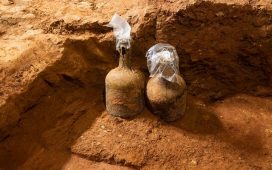An Indigenous man working for a restaurateur in San Antonio, Texas, claims he was fired after he refused to destroy artefacts and human remains unearthed during the renovation of a restaurant near the Alamo, an 1836 battleground (and now tourist destination) where several mass graves and archeological objects have been previously discovered.
In a lawsuit filed this month, John McCormack, who was hired as an executive chef and site manager, alleges that Sam Panchevre, the owner of various restaurants in downtown San Antonio, instructed him to covertly remove and discard several artefacts and human remains discovered on the grounds of the Fig Tree restaurant, in order to avoid delaying the project.
Enrique Vasquez, the construction foreman overseeing several projects for Panchevre, alerted Panchevre in May last year that workers had discovered large quantities of objects from the 1800s while building a patio for the Fig Tree, such as glass and porcelain vessels. In the following months, workers discovered organic materials, including around 500 bones, as well as arrowheads, ceramics and other objects.
Since 2019, tribes with association to the area have mobilised to stop a pending $400m renovation plan for the Alamo site, calling for the Texas government to declare the grounds a protected cemetery. The revamp includes plans for a $15m 100,000 sq. ft museum and visitor centre designed by the San Francisco-based architecture firm Gensler, which the Texas Historical Commission approved last year.
According to Alfonso Kennard, the lawyer representing McCormack, his client salvaged and stored some of the objects with the intention of transferring them to a university or museum, where the findings could be catalogued and repatriated in accordance to the Native American Graves and Protection Act, a statute requiring federally-funded institutions to inventory their holdings of Indigenous human remains and burial items to facilitate their return to respective tribes.
“These are historical items that should not be summarily discarded for the sake of a construction project, where otherwise the Texas Historical Commission would have been involved,” Kennard says. “McCormack approached universities and other institutions but these institutions responded that the Commission has to approve such donations, but it has failed to act on this.”
He adds, “There’s thousands of years of history on this site that predate Texas planting their flag here. These items do not belong in the dumpster, and the Texas Historical Commission has neglected their duties in this case, in my opinion. The reason the lawsuit was filed is because my client refused to engage in illegal activity but there’s other issues involved, like the egregious nature of someone putting profits over human interest.”
McCormack is seeking between $200,000 to $1m in damages and was not available for comment, as the case is still ongoing. Kennard was not able to confirm McCormick’s tribal affiliation. A request for comment from the Texas Historical Commission was not returned by the time of this writing.









